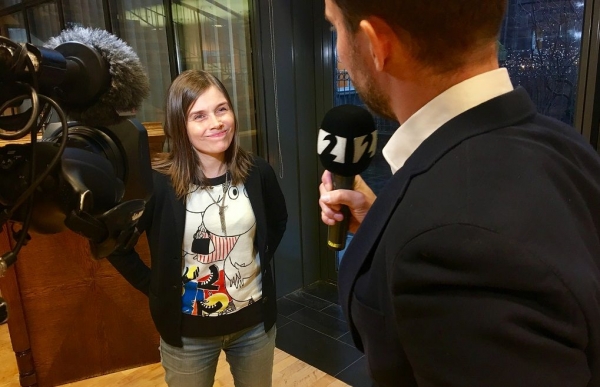Guðni Th. Jóhannesson, the President of Iceland has handed the mandate to form a new government to Birgitta Jónsdóttir, the leader of the Pirate Party, the local news site visir.is reports. Birgitta is the third party leader who is granted the mandate to form a government.
Read more: The stalemate in Icelandic politics: What' going on and why is there no coalition in sight?
Pirates won't demand Prime Minister's office

The Pirate party came in third in the October 29 elections, with 10 MPs and 14.5% of the vote. It remains to be seen whether Birgitta will be able to break the impasse in Icelandic politics. Birgitta Jónsdóttir told the Icelandic National Broadcasting Service RÚV that she believed it was possible to reach an agreement on a five party center-left coalition, despite the fact that a previous attempt by Katrín Jakobsdóttir, the chairwoman of the Left-green movement, having failed to hammer out an agreement between the five parties.
Birgitta told RÚV that the Pirate party did not enter the negotiations with the demand that she, or the party, be handed the office of Prime Minister. The party was also interested in getting the office of the Speaker of Parliament, an office which makes the ultimate decision on the procedures of debate in parliament. The Pirate party has stressed the need to reform how Parliament and the government in general operates.
Disagreements over tax-hikes and reforms
The main area of disagreement between the five centrist and left wing parties are taxes and reforms to the fisheries and agriculture. The Left-greens have stressed the need to raise taxes on the wealthy and corporations, especially the fisheries, to fund investments in healthcare, education and infrastructure. The centrist restoration has opposed tax hikes. The five parties also disagree on how to reform the system of individually transferrable quotas in the fisheries. While the centrist parties and the Pirate party prefer a market-based solution, where the quotas are auctioned off to the highest bidder, the Left-greens have stressed command and control approaches.
Government crisis looms

Previously the chairmen of the two largest parties in Parliament, the conservative Independence party and the Left-green movement, had failed to form a government. Since Katrín Jakobsdóttir, chairwoman of the Left-greens, returned the mandate one week ago no party leader has had the mandate, as the President told party leaders that they should take time to engage in informal talks to find common ground before formal talks could resume.
Despite the parties having spent the five weeks since the October 29 elections in negotiations no coalition government seems to be in sight. Iceland is basically facing a government crisis, many have pointed out. At a press conference at Bessastaðir, the President's residence, the President of Iceland rejected such claims, pointing out there were plenty of historical precedents for negotiations taking a long time, RÚV reports. Guðni Th. is a former professor of history at the University of Iceland and a presidential scholar.
Guðni Th. Jóhannesson, the President of Iceland has handed the mandate to form a new government to Birgitta Jónsdóttir, the leader of the Pirate Party, the local news site visir.is reports. Birgitta is the third party leader who is granted the mandate to form a government.
Read more: The stalemate in Icelandic politics: What' going on and why is there no coalition in sight?
Pirates won't demand Prime Minister's office

The Pirate party came in third in the October 29 elections, with 10 MPs and 14.5% of the vote. It remains to be seen whether Birgitta will be able to break the impasse in Icelandic politics. Birgitta Jónsdóttir told the Icelandic National Broadcasting Service RÚV that she believed it was possible to reach an agreement on a five party center-left coalition, despite the fact that a previous attempt by Katrín Jakobsdóttir, the chairwoman of the Left-green movement, having failed to hammer out an agreement between the five parties.
Birgitta told RÚV that the Pirate party did not enter the negotiations with the demand that she, or the party, be handed the office of Prime Minister. The party was also interested in getting the office of the Speaker of Parliament, an office which makes the ultimate decision on the procedures of debate in parliament. The Pirate party has stressed the need to reform how Parliament and the government in general operates.
Disagreements over tax-hikes and reforms
The main area of disagreement between the five centrist and left wing parties are taxes and reforms to the fisheries and agriculture. The Left-greens have stressed the need to raise taxes on the wealthy and corporations, especially the fisheries, to fund investments in healthcare, education and infrastructure. The centrist restoration has opposed tax hikes. The five parties also disagree on how to reform the system of individually transferrable quotas in the fisheries. While the centrist parties and the Pirate party prefer a market-based solution, where the quotas are auctioned off to the highest bidder, the Left-greens have stressed command and control approaches.
Government crisis looms

Previously the chairmen of the two largest parties in Parliament, the conservative Independence party and the Left-green movement, had failed to form a government. Since Katrín Jakobsdóttir, chairwoman of the Left-greens, returned the mandate one week ago no party leader has had the mandate, as the President told party leaders that they should take time to engage in informal talks to find common ground before formal talks could resume.
Despite the parties having spent the five weeks since the October 29 elections in negotiations no coalition government seems to be in sight. Iceland is basically facing a government crisis, many have pointed out. At a press conference at Bessastaðir, the President's residence, the President of Iceland rejected such claims, pointing out there were plenty of historical precedents for negotiations taking a long time, RÚV reports. Guðni Th. is a former professor of history at the University of Iceland and a presidential scholar.







